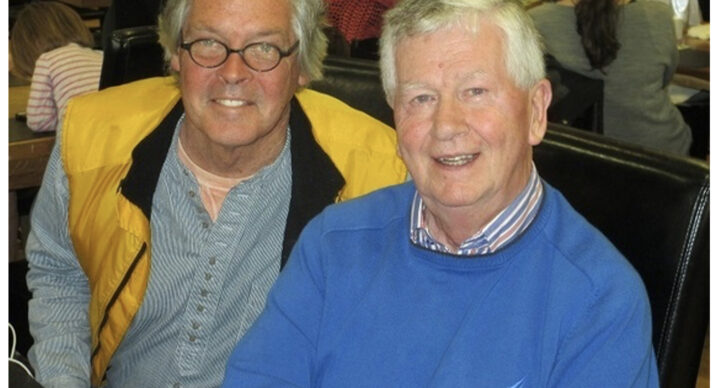“The human race has one really effective weapon, and that is laughter.”—Mark Twain
It’s easy often to feel sorry for oneself—the pity thing.
There’s a bit of Eyore in all of us—the forever gloomy old gray donkey in A.A. Milne’s Winnie in Pooh and the Honey Tree: “I was so upset, I forgot to be happy…”
Mea Culpa, Mea Culpa! I’ve walked in these shoes so many times.
But I’ve learned, the hard way, over the years that a pity party is a lonely party of one. No candles to blow out.
So in my battle against Alzheimer’s, prostate cancer, depression, and a gradual shutdown of my mind and body, I’ve turned to laughter. What’s so funny about that? Well, for me, that has made all the difference in lifting my faith and hope, while some of the brightest minds in the world, like the Cure Alzheimer’s Fund, are racing for a cure for Alzheimer’s and other forms of dementia.
Patience is a virtue that I’m chasing. Laughter has given me a side road to rage.
“So many people feel they can’t laugh in the face of a serious thing like Alzheimer’s,” says dementia educator Lori La Bey, founder of Alzheimer’s Speaks, a radio show about Alzheimer’s and Alzheimer’s care. “But laughter is the core ingredient of a good relationship — the moments that bind you, melt your heart and stay with you.”
Hold that thought.
Cites a 2019 Japanese study in the National Library of Medicine: laughter induces biological benefits from the release of positive hormones like endorphins that lessen stress hormones. The study concludes that laughter therapy lowers blood pressure and pain for people 60 years and older.
Notes the website VeryWell Mind, “Research has shown that the health benefits of laughter are far-ranging. Studies so far have shown that laughter can help relieve pain, bring greater happiness, and even increase immunity. Positive Psychology names the propensity for laughter and sense of humor as one of the 24 main signature strengths one can possess. Unfortunately, however, many people don’t get enough laughter in their lives. In fact, one study suggests that healthy children may laugh as much as 400 times per day, but adults tend to laugh only 15 times per day.”
The turning point for me in my Alzheimer’s, which has taken several family members, was two suicide attempts. I’m not proud of that—a come-to-Jesus moment for me, or wisdom from the universe, depending on one’s perspective. “ Not my time,” I heard in my soul.
I’ve never looked back. I began walking in faith and humor, and wrote a book titled: On Pluto, Inside the Mind of Alzheimer’s, which opened doors to speaking engagements around the country, with my son Conor by my side so I didn’t get lost.
I was asked several years ago to speak in advance of a Boston Alzheimer’s race at a well-attended pre-event held at the Improv Asylum Comedy Club in the North End of the city—sketch comedy in the style of Saturday Night Live and Second City. I was told to keep my remarks brief with a sharp focus on fundraising for an Alzheimer’s cure.
“Can I be funny?” I asked the club manager.
“Funny???” he replied.
“I thought this was a comedy club!” I responded.
“But you have Alzheimer’s and that’s not funny,” he said.
“Yeah, but you have no idea,” I interrupted.
After more back-and-forth, a compromise was reached: I would try my Alzheimer’s humor for about three minutes, and the manager would give me a sign if I needed to be more serious.
After I had the audience and son Conor in shrill laughter reading from pages of my notes about funny stories of getting lost, losing my filter, seeing things that weren’t there, loss of self and loss of place, the manager signaled me from the back of the room in a way that said, “Go for it!” And so I did for 45 minutes—a comedy club appearance from a guy with Alzheimer’s who could make people laugh.
It doesn’t get any better.
And so, I took the show on the road with Conor, telling funny Alzheimer’s stories around the country at invites to groups of 500 to a thousand people. Humor, I learned, can be a path to awareness about a cruel disease like Alzheimer’s and other dementias. It breaks the barriers down.
The humor continues on my journey, but not funny at all times. There’s the Nun Story.
A while back, my wife of 41 years, Mary Catherine left for a well-deserved school break to see her incredible family in Phoenix. Conor was left behind to guide the family tiller. But on Cape Cod, where we live, there are dangerous storm currents, rip tides, and sharks—not only on the beach but inside the mind of Alzheimer’s.
The sharks were thrashing as Mary Catherine’s Boeing 737 lifted off the tarmac at Boston’s Logan Airport, and banked a left for Phoenix. The start of the week was uneventful, other than the continued breakdown of the mind and body.
I had a speech that Wednesday outside Boston; Conor, my sergeant-in-arms, drove me. I’m not allowed to drive. Repairs to the Sagamore Bridge that connects Cape Cod to the mainland added two stressful hours to a two-hour trip. We didn’t get home until late. The following day I was to speak again in Wellesley, which is just outside of Boston, before a Sisters of Charity event that attracted a broad audience.
But first I had to head to Nantucket on a writing assignment. Like others in this disease, I still have to make a living or face bankruptcy. I felt terrible about the stress on Conor, and so the next morning, without telling him, I made a bad command decision to drive a half hour to Hyannis to take the ferry to Nantucket. Remember, I’m not allowed to drive…I called Conor and told him to meet me at the boat when I returned, and he could drive me to Boston. A good plan, I thought. Well, not so good. Conor was angry!
Arriving back on the Hyannis dock, I learned there was a two to three-hour backup at the bridge. No way was I going to make the speech, high stress. So I made a decision, another bad one, lacking judgment, to drive to Wellesley by myself. I called Conor from the car and he appropriately reamed me for this decision. Maneuvering through bridge traffic was a labyrinth, a maze of chaos. I prayed half the time; took the Lord’s name in vain the other half.
Using a hands-free phone, I called the nuns to tell them I’d be about a half hour to 40 minutes late, using the collective “we.” They kept calling periodically to ensure I was on schedule. The audience was assembling, and one of the nuns began reading from my book, “On Pluto” to appease the crowd—a mix of nuns, caregivers, those with Alzheimer’s, and other interested parties.
As I got close, I realized I didn’t have the exit number off the highway. So I called again.
“Sister,” I asked, “What’s the exit number?”
She didn’t know the precise number, then said: “Are you ok? I gave the exit number to Conor. Just ask him.”
There was a pause at my end.
“Conor…is, uh…not in the car,” I said.
There was a pause at her end, as she cupped the phone, and turned to the nun standing next to her.
“Oh sh*t! He’s alone!” she whispered.
I explained the situation, said I was okay, but required the re-entry code. “I need you to be one of those guys at the airport, with the large flash-light devices that guide planes to the gates,” I said.
The sisters agreed, stayed on the phone for more than 15 minutes, and brought me safely into a landing. They positioned associates at the entrance to the facility, waving at me, so I didn’t miss the turn. I felt like Christ entering Jerusalem on Palm Sunday.
I had my speech in hand and read it carefully, getting a standing ovation at the conclusion. After the book signing, I was ready to go but feared the ride home. I could have stopped overnight at any number of friends’ homes, but worried they might rat me out to my wife. Again, the judgment thing.
“Not so fast,” said one of the nuns, calling upon the audience to pray for me, with hands outstretched in almost a Billy Graham moment.
Amen, God ordained, I thought, my ticket to safe passage home.
After the prayer, two friendly but imposing nuns about the size and stature of pro linebackers approached me. “Gregory,” they said. “Not so fast: YOU’RE NOT DRIVING!”
Upon learning of my bad judgment, the nuns had conferenced with what seemed like the urgency of a Vatican Council. I was told that one of the nuns would drive my car back to the Cape, with me strapped in the passenger seat, and another nun would follow, God bless them. “We want to do this,” they said. “And besides, if something happened to you on the way, the world would say our prayers don’t work.”
The verdict was delivered.
“Oh, and one more thing, Gregory,” they said. “We called your house and left a voice message for your wife about all this.”
“Oh sh*t!” I thought.
Obviously, I had to delete the message when I got home, but in Alzheimer’s simple tasks like receiving and deleting voice messages are not simple. I had forgotten how to do it. So the next day, I sent a text to my wife in Phoenix.
“I’m getting some ‘work-related’ messages on the home phone. Can you tell me how to access and delete, so there’s room for your messages?”
I got a text back from Mary Catherine with the code, then listened to the voicemail in horror: “Mrs. O’Brien, we wanted to let you know that your husband drove here alone. He shouldn’t have done that. Poor judgment. We care about him, and drove him home safely.”
Ping. I hit the delete button. Now there’s no message, no trace…I’m hoping she doesn’t read this.
I’m not a bad person, just muddled at times.
Alzheimer’s has taught me to look for silver linings in life, having just turned 74. Unexpectedly, I saw one recently in a Wall Street Journal piece titled, “Viagra Could Be Good for your Brain. “New research from the Cleveland Clinic suggests the erectile-dysfunction drug could ward off cognitive decline, illustrating how artificial intelligence can help scientists repurpose old medications for new diseases,” the story reported, noting the study was published in the Journal of Alzheimer’s Disease.
Can’t make this stuff up!
Gotta laugh…
Greg O’Brien is a career journalist, writer and author. He lost his maternal grandfather, mother, and paternal uncle to Alzheimer’s, and before his father’s death, his dad was diagnosed with dementia.
(The views and opinions expressed in this writing are solely those of the author.)








